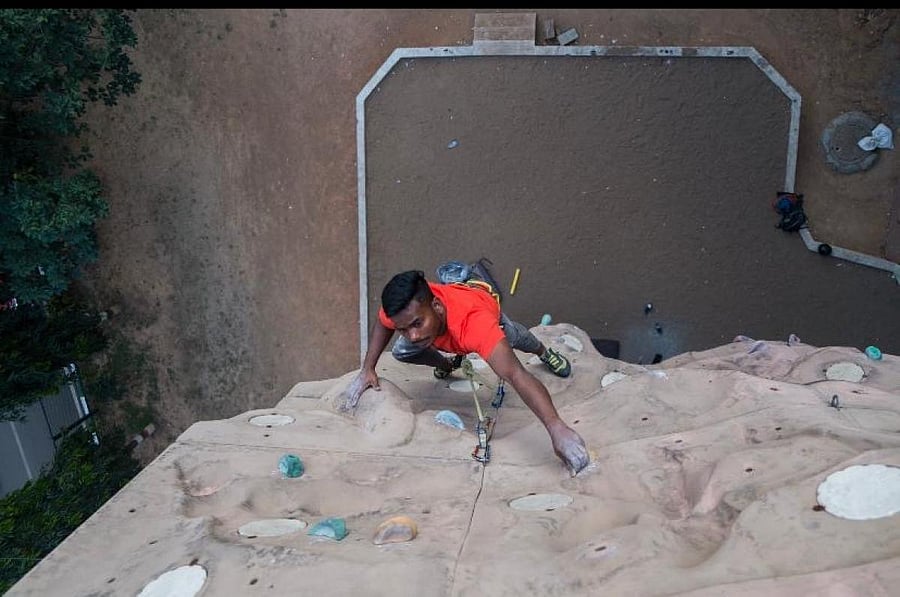Manikandan Kumar rests on his shiny car facing the GETHNAA climbing wall at the Sree Kanteerava stadium. A firm handshake and a genial smile are quickly followed by a slew of stinging statements about the state of the wall and the rubble at his workspace.
On the wall and from afar he seems rather timid. Up close, the man is fire. And if you didn’t notice a slight limp in his gait, you probably wouldn’t even know that he had the post-polio syndrome singe his system, right leg in particular, when he was five-year-old. You really would just see him for what he is: a world-class athlete. An angry one at the moment, but we’ll get to that eventually. It’s Manikandan’s 18-year journey which has led us to his playground this morning.
When Kumar and Usha Rani birthed a healthy baby boy 32 years ago, they weren’t sure how they were going to manage their lives. Kumar earned just about enough for two meals a day as a carpenter and the mother broke her back fending for the hyperactive but ill child in a shanty in Okalipuram.
Now, imagine how they took to the news of the disability! The concern, the bills, the extra care, the time they didn’t have to spare…. it was ‘hell’ for the couple. But, and this is where they showed how good parenting can transcend income brackets; they never did let the bleak development change their demeanour towards Mani. They didn’t coddle him into petty entitlement. School meant school and no amount of bullying or name-calling at that government institution was going to give Mani time away.
He could complain all he wanted but he was just going to have to face it. Eventually, Mani stopped with the grumbling. That inculcated trait is permeating when you talk to him even today, it’s the one that gives you a feeling of having watched an especially motivational episode of TedTalks.
“There is no point in complaining. You want something, you go get it,” he slogans. “I do not like excuses. I did not make excuses. I have achieved everything so far only because I never gave into this habit of making excuses. It’s what the weak do and I will not allow myself to be that.”
You get the picture.
The parents understood that this is the posture they would have to contest against for a long time when he signed up to become a professional climber when only 15 years old. They wanted some help with the finances and a college degree for their only son would have been a nice additive, but Mani wasn’t giving them either.
Following an adventure camp for the disabled, Mani was hooked. He wanted to be world champion and he painted the streets between his home and GETHNAA with this dream. His schooling ended when his climbing education began. Freelance gigs as a trainer helped along the way but it wasn’t easy going home without much to show for.
That was until 2012 rolled in and he won the gold medal in the IFSC Paraclimbing World Championship at the Bercy Stadium in Paris. Three world championship titles and several other world titles have since been realised, but the want for more hasn’t disappeared.
“After I won the world title, the people at home stopped hounding me about my career choice. It came after a long, long time but I knew it would be worth it, and it was,” he says. “One of my proudest achievements isn’t that I am a multiple-time world champion, it’s that I take care of parents now.
“I pay for everything. My dad still occasionally does some carpentry but he is old and that also he does because he gets bored, not out of necessity. I am happy to be able to afford him this luxury. We also moved to a much better location in Malleswaram and that’s another big, big more for me.”
****
Although he doesn’t say so categorically, it is evident that Mani has had to listen to folks downplay his potential, the ferocity with which he wants to overcome odds and climb financial and sporting tiers makes it plenty abundant.
Which is why he even dabbles with the idea when asked about the possibility of qualifying among able-bodied climbers for the Tokyo Olympics this year.
*****
“There is nothing stopping me but it’s just that the qualification grades are impossibly high… for me, right now. Sure, I could work on it and up my grades and possibly even get there, but instead, I would rather focus on the Paralympics in 2023 and 2028. That’s the one medal I haven’t won yet. I am giving myself the next eight years to get there.”
Building on he says the shoddy infrastructure in the country is one of the reasons why he and the rest of the community are unable to achieve greater heights in the sport. “This wall was put up close to 20 years ago, and it’s horrible. I constantly need to go to Austria or the US to train and it’s difficult when you have little or no support from the government,” he says.
“Also, look at this construction waste. They have used this as a dumping ground. How can anyone train her and become anything?! This is the problem. Until someone with a keen interest in the sport gets to a position where they can make some changes, nothing is going to happen.”
Wonder who fits that bill!

